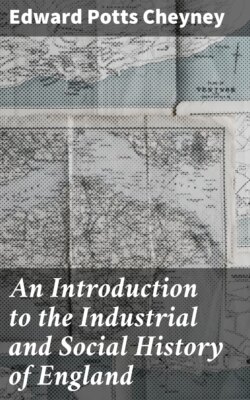Читать книгу An Introduction to the Industrial and Social History of England - Edward Potts Cheyney - Страница 12
На сайте Литреса книга снята с продажи.
GENERAL WORKS
ОглавлениеCertain general works which refer to long periods of economic history will be mentioned here and not again referred to, excepting in special cases. It is to be understood that they contain valuable matter on the subject, not only of this, but of succeeding chapters. They should therefore be consulted in addition to the more specific works named under each chapter.
Cunningham, William: Growth of English Industry and Commerce, two volumes. The most extensive and valuable work that covers the whole field of English economic history.
Ashley, W. J.: English Economic History, two volumes. The first volume is a full and careful analysis of mediæval economic conditions, with detailed notes and references to the primary sources. The second volume is a work of original investigation, referring particularly to conditions in the fifteenth and sixteenth centuries, but it does not give such a clear analysis of the conditions of its period as the first volume.
Traill, H. D.: Social England, six volumes. A composite work including a great variety of subjects, but seldom having the most satisfactory account of any one of them.
Rogers, J. E. T.: History of Agriculture and Prices; Six Centuries of Work and Wages; Economic Interpretation of History. Professor Rogers' work is very extensive and detailed, and his books were largely pioneer studies. His statistical and other facts are useful, but his general statements are not very valuable, and his conclusions are not convincing.
Palgrave, R. H. I.: Dictionary of Political Economy. Many of the articles on subjects of economic history are the best and most recent studies on their respective subjects, and the bibliographies contained in them are especially valuable.
Four single-volume text-books have been published on this general subject:—
Cunningham, William, and McArthur, E. A.: Outlines of English Industrial History.
Gibbins, H. de B.: Industry in England.
Warner, George Townsend: Landmarks in English Industrial History.
Price, L. L.: A Short History of English Commerce and Industry.
Special Works
Seebohm, Frederic: The English Village Community. Although written for another purpose—to suggest a certain view of the origin of the medieval manor—the first five chapters of this book furnish the clearest existing descriptive account of the fundamental facts of rural life in the thirteenth century. Its publication marked an era in the recognition of the main features of manorial organization. Green, for instance, the historian of the English people, seems to have had no clear conception of many of those characteristics of ordinary rural life which Mr. Seebohm has made familiar.
Vinogradoff, Paul: Villainage in England.
Pollock, Sir Frederick, and Maitland, F. W.: History of English Law, Vol. 1.
These two works are of especial value for the organization of the manor courts and the legal condition of the population.
Sources
Much that can be explained only with great difficulty becomes clear to the student immediately when he reads the original documents. Concrete illustrations of general statements moreover make the work more interesting and real. It has therefore been found desirable by many teachers to bring their students into contact with at least a few typical illustrative documents. The sources for the subject generally are given in the works named above. An admirable bibliography has been recently published by
Gross, Charles: The Sources and Literature of English History from the Earliest Times to about 1485. References to abundant material for the illustration or further investigation of the subject of this chapter will be found in the following pamphlet:—
Davenport, Frances G.: A Classified List of Printed Original Materials for English Manorial and Agrarian History.
Sources for the mediæval period are almost all in Latin or French. Some of them, however, have been more accessible by being translated into English and reprinted in convenient form. A few of these are given in C. W. Colby: Selections from the Sources of English History, and G. C. Lee: Source Book of English History.
In the Series of Translations and Reprints from the Original Sources of European History, published by the Department of History of the University of Pennsylvania, several numbers include documents in this field. Vol. III, No. 5, is devoted entirely to manorial documents.
Discussions of the Origin of the Manor
The question of the origin of the mediæval manorial organization, whether it is principally of native English or of Roman origin, or hewn from still other materials, although not treated in this text-book, has been the subject of much interest and discussion. One view of the case is the thesis of Seebohm's book, referred to above. Other books treating of it are the following:—
Earle, John: Land Charters and Saxonic Documents, Introduction.
Gomme, G. L.: The Village Community.
Ashley, W. J.: A translation of Fustel de Coulanges, Origin of Property in Land, Introduction.
Andrews, Charles M.: The Old English Manor, Introduction.
Maitland, F. W.: Domesday Book and Beyond.
Meitzen, August: Siedelung und Agrarwesen, Vol. II, Chap. 7.
The writings of Kemble and of Sir Henry Maine belong rather to a past period of study and speculation, but their ideas still lie at the base of discussions on the subject.
